【尚择优选】最新4A朗文Chapter 4和5知识点梳理.doc
最新香港朗文4A各单元知识要点 词汇语法
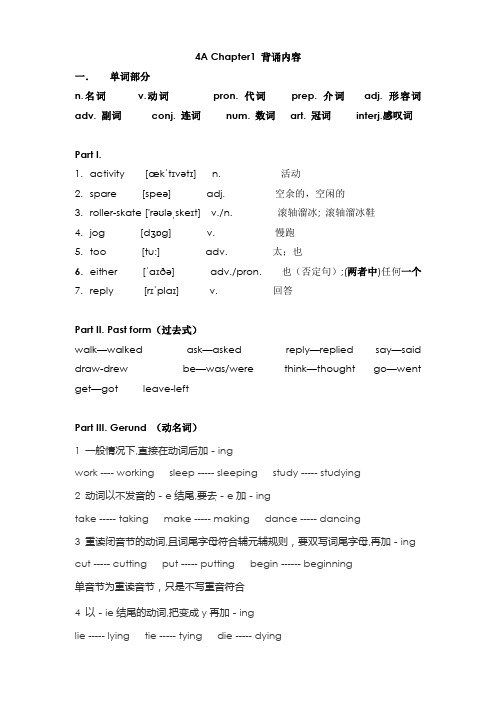
4A Chapter1 背诵内容一.单词部分n.名词v.动词pron. 代词prep. 介词adj. 形容词adv. 副词conj. 连词num. 数词art. 冠词interj.感叹词Part I.1.activity [ækˈtɪvətɪ] n. 活动2.spare [speə] adj. 空余的,空闲的3.roller-skate ['rəʊləˌskeɪt] v./n. 滚轴溜冰; 滚轴溜冰鞋4.jog [dʒɒg] v. 慢跑5.too [tu:] adv. 太;也6.either [ˈaɪðə] adv./pron. 也(否定句);(两者中)任何一个7.reply [rɪˈplaɪ] v. 回答Part II. Past form(过去式)walk—walked ask—asked reply—replied say—said draw-drew be—was/were think—thought go—went get—got leave-leftPart III. Gerund (动名词)1 一般情况下,直接在动词后加-ingwork ---- working sleep ----- sleeping study ----- studying2 动词以不发音的-e结尾,要去-e加-ingtake ----- taking make ----- making dance ----- dancing3 重读闭音节的动词,且词尾字母符合辅元辅规则,要双写词尾字母,再加-ing cut ----- cutting put ----- putting begin ------ beginning单音节为重读音节,只是不写重音符合4 以-ie结尾的动词,把变成y再加-inglie ----- lying tie ----- tying die ----- dying二.词组部分1.i n one’s spare time在某人的空余时间2.listen to (the) music 听音乐3.play chess 下棋4.like/love/enjoy doing 喜欢干某事5.go swimming (去)游泳6.go jogging (去)慢跑7.go roller-skating (去)溜冰8.be good at sth./doing 擅长于某事/干某事9.be poor at sth./doing 不擅长于某事/干某事10.be interested in sth./doing 对干某事/干某事感兴趣11.be afraid of sth./doing 害怕某事/干某事12.at/on the weekend 在周末at/on weekends13.on weekdays 在工作日14.be busy with sth. 忙于某事15.be busy doing 忙于干某事16.enjoy oneself= have a good time 某人玩得很开心17.a family helper 一位家庭帮手18.pick up kids 接小孩19.play the piano/violin 弹钢琴,拉小提琴(西洋乐器名词前加the )20.play Erhu 拉二胡(民族乐器前无the)21.play table tennis 打羽毛球(球类名词前无the)22.play on the swing/slide 在秋千(滑滑梯)上玩23.play with sb. 与某人一起玩24.play with sth. 玩耍某物25.a bit later 一会儿以后26.walk away sadly 难过地走开了27.walk the dog 溜狗28.walk home=go home on foot 走回家29.go home =go back home 回家30.after that 在那以后31.the black notes (钢琴上)黑键32.see sb. doing 看到某人在干某事33.make a new friend named Tom 交了一个叫汤姆的朋友34.in fact = actually/ˈæktʃʊəlɪ/事实上35.in the gym 在体育馆36.indoor stadium /'steɪdɪəm/ 室内体育馆37.finish sth./doing sth. 完成某事/干某事38.be important to sb. 对某人而言是重要的(绿色字体部分为拓展内容,供学有余力的小朋友默写。
最新香港朗文4A各单元知识要点词汇语法

最新香港朗文4A各单元知识要点词汇语法以下是最新版香港朗文4A各单元的词汇和语法要点:Unit 1: Going Places- 词汇:transportation(交通工具),destination(目的地),navigate(导航),explore(探索)- 语法:一般现在时,there is / there are句型,情态动词can的用法Unit 2: Nature's Forces- 词汇:natural disasters(自然灾害),flood(洪水),earthquake(地震),hurricane(飓风),volcano(火山)- 语法:一般过去时,情态动词must / mustn't的用法Unit 3: Materials and Properties- 词汇:materials(材料),properties(特性),solid(固体),liquid(液体),gas(气体)- 语法:现在进行时,情态动词should / shouldn't的用法Unit 4: Diverse Cultures- 词汇:diverse(多样化的),culture(文化),tradition(传统),custom(风俗),celebration(庆祝活动)- 语法:现在完成时,情态动词could / couldn't的用法Unit 5: The Arts- 词汇:artistic(艺术的),creative(创造性的),performance(表演),sculpture(雕塑),painting(绘画)-语法:一般将来时- 语法:过去进行时,情态动词may / must的用法以上是最新香港朗文4A各单元的词汇和语法要点。
请注意,这些要点可能会因版本差异而有所变化,建议参考最新教材或教师的指导。
香港朗文版4A-Chapter5
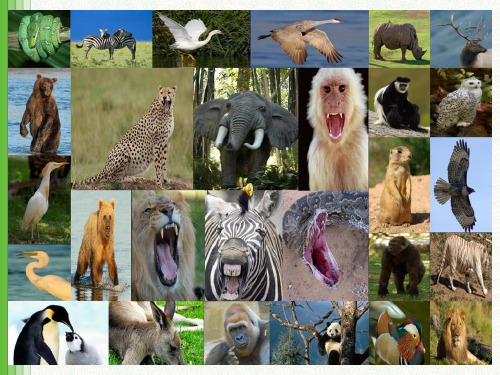
What is this ?
Examples
+ er
+r –y -i + er 双写辅音字母 + er
tall taller short shorter small smaller
large larger nice nicer
hungry hungrier happy happier heavy heavier
The turtle is the king in the sea.
What animal will be the king on land?
(陆地动物谁能称王呢?)
I think the horse. It is tall.
tall
a horse
The horse, the camel and the giraffe are tall.
Animals big and small
DTuorlptleh:inI:waInwt taontbe the tk明IoiStn)habhgme.e.arIkbtkaihen:meagIu.kctIilwienfaagvumne.lt.r(stto聪robneg.
One day, the sea animals chose (选) a king.
+r
large the largest
nice the nicest
–y -i + er
hungry the hungriest happy the happiest heavy the heaviest
双写辅音字母 big
+ er
fat fit
the biggest the fattest the fittest
香港朗文英语4A Chapter 5复习提要
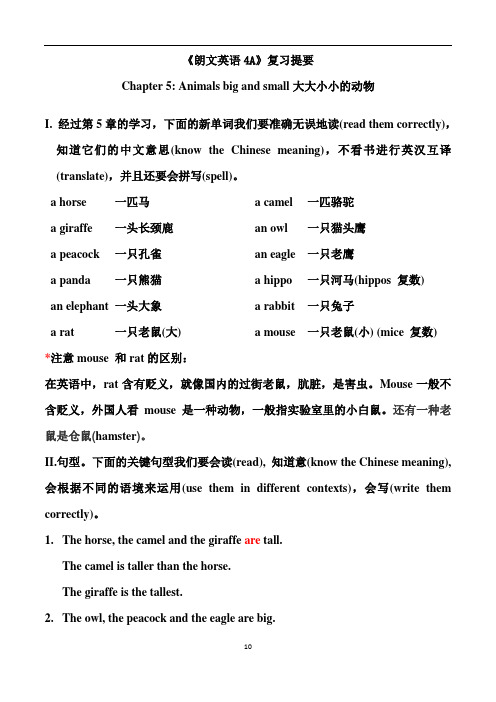
《朗文英语4A》复习提要Chapter 5: Animals big and small大大小小的动物I. 经过第5章的学习,下面的新单词我们要准确无误地读(read them correctly),知道它们的中文意思(know the Chinese meaning),不看书进行英汉互译(translate),并且还要会拼写(spell)。
a horse 一匹马 a camel 一匹骆驼a giraffe 一头长颈鹿an owl 一只猫头鹰a peacock 一只孔雀an eagle 一只老鹰a panda 一只熊猫 a hippo 一只河马(hippos 复数)an elephant 一头大象 a rabbit 一只兔子a rat 一只老鼠(大) a mouse 一只老鼠(小) (mice 复数)*注意mouse 和rat的区别:在英语中,rat含有贬义,就像国内的过街老鼠,肮脏,是害虫。
Mouse一般不含贬义,外国人看mouse是一种动物,一般指实验室里的小白鼠。
还有一种老鼠是仓鼠(hamster)。
II.句型。
下面的关键句型我们要会读(read), 知道意(know the Chinese meaning), 会根据不同的语境来运用(use them in different contexts),会写(write them correctly)。
1. The horse, the camel and the giraffe are tall.The camel is taller than the horse.The giraffe is the tallest.2. The owl, the peacock and the eagle are big.The peacock is bigger than the owl.The eagle is the biggest.3. The panda, the hippo and the elephant are heavy.The hippo is heavier than the panda.The elephant is the heaviest.4. The rabbit, the rat and the mouse are small.The rat is smaller than the rabbit.The mouse is the smallest.总结: (1). 比较级结构:A+ be+ adj.er + than+ B. : A比B……be动词由时态和主语A决定。
香港朗文2Bchapter4知识清单
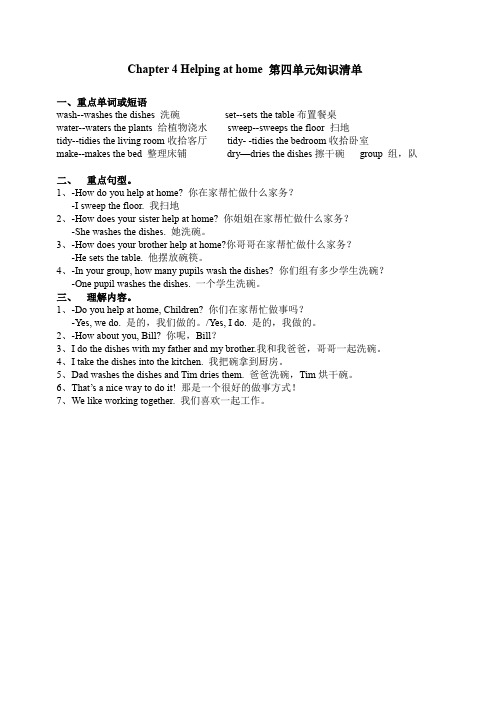
Chapter 4 Helping at home 第四单元知识清单一、重点单词或短语wash--washes the dishes 洗碗set--sets the table布置餐桌water--waters the plants 给植物浇水sweep--sweeps the floor 扫地tidy--tidies the living room收拾客厅tidy- -tidies the bedroom收拾卧室make--makes the bed 整理床铺dry—dries the dishes擦干碗group 组,队二、重点句型。
1、-How do you help at home? 你在家帮忙做什么家务?-I sweep the floor. 我扫地2、-How does your sister help at home? 你姐姐在家帮忙做什么家务?-She washes the dishes. 她洗碗。
3、-How does your brother help at home?你哥哥在家帮忙做什么家务?-He sets the table. 他摆放碗筷。
4、-In your group, how many pupils wash the dishes? 你们组有多少学生洗碗?-One pupil washes the dishes. 一个学生洗碗。
三、理解内容。
1、-Do you help at home, Children? 你们在家帮忙做事吗?-Yes, we do. 是的,我们做的。
/Yes, I do. 是的,我做的。
2、-How about you, Bill? 你呢,Bill?3、I do the dishes with my father and my brother.我和我爸爸,哥哥一起洗碗。
4、I take the dishes into the kitchen. 我把碗拿到厨房。
4A朗文Chapter 4和5知识点梳理

4A朗文Chapter 4与5知识点梳理【必讲知识点】1、辨析 few,a few, little, a little:few 极少,几乎没有表示“否定”意义接可数名词复数形式a few 少许表示“肯定”意义接可数名词复数形式little 极少,几乎没有表示“否定”意义接不可数名词a little 少许表示“肯定”意义接不可数名称2、 fewer与 less都可以表示“更少”(1) fewer 后接可数名词得复数形式,就是 few得比较级(2) less 后接不可数名词,就是 little得比较级3、辨析 much,many, so much与 so manyso much 如此多接不可数名词so many 如此多接可数名词得复数形式much 许多接不可数名词many 许多接可数名词得复数形式4、 a lot of = lots of 表示许多,后可接可数名词得复数形式以及不可数名词。
5、 stop 用法stop to do 停止去做另外一件事stop doing 停止做某事(指手头得事)6、There be句型得一般过去时1.肯定式there be句型得一般过去时表示过去某地或某时存在某人或某物,其一般过去时态得陈述句由“there+was/were+主语+地点状语+时间状语”构成。
there was后接单数名词;there were后接复数名词。
例如:There was a car under the tree a moment ago、刚才这棵树下有一辆小轿车。
There were two foreign teachers in our school last year、去年我们学校有两名外教。
2.否定式there be句型一般过去时得否定式就是在动词was或were得后面加not,可缩写为wasn’t或weren’t。
例如:There wasn’t a film in the cinema last night、昨晚电影院里没有演电影。
最新朗文4A-Chapter-4复习提要
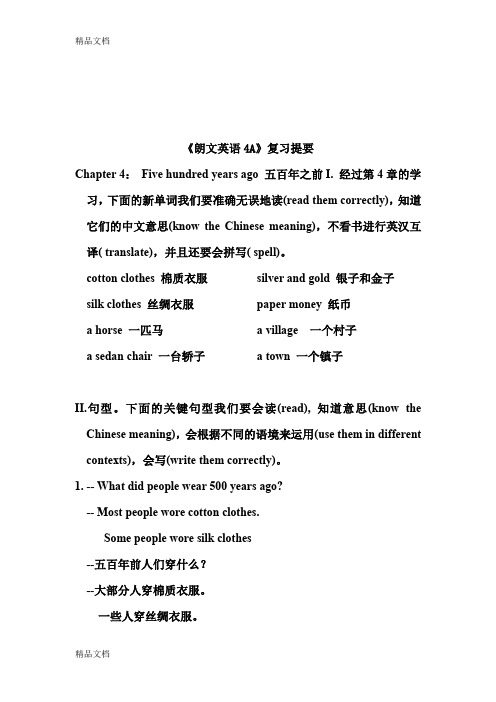
《朗文英语4A》复习提要Chapter 4:Five hundred years ago 五百年之前I. 经过第4章的学习,下面的新单词我们要准确无误地读(read them correctly),知道它们的中文意思(know the Chinese meaning),不看书进行英汉互译( translate),并且还要会拼写( spell)。
cotton clothes 棉质衣服silk clothes 丝绸衣服a horse 一匹马a sedan chair 一台轿子silver and gold 银子和金子paper money 纸币a village 一个村子a town 一个镇子II.句型。
下面的关键句型我们要会读(read), 知道意思(know the Chinese meaning),会根据不同的语境来运用(use them in different contexts),会写(write them correctly)。
1. -- What did people wear 500 years ago?-- Most people wore cotton clothes.Some people wore silk clothes--五百年前人们穿什么?--大部分人穿棉质衣服。
一些人穿丝绸衣服。
2. -- How did people travel 500 years ago?-- Most people walked or rode horses.Rich people travelled by sedan chairSome people travelled by boat.-- 五百年前人们怎么旅行?-- 大部分人步行或骑马去旅行。
富人坐轿子旅行。
一些人坐船旅行。
3. -- How did people pay for things 500 years ago? Or we can say: How did people pay 500 years ago?-- Most people paid for things with silver and gold. Or we can say: Most people paid with silver and gold.-- Some people paid for things with paper money. Or we can say: Some people paid with paper money. -- 五百年前人们怎么买东西?-- 大部分人用银子和金子买东西。
4AUnit4知识点归纳

4AUnit4知识点归纳一、语音: 字母f的发音/ f / afternoon breakfast family father football five for funny four fourteen fifteen fat fruit wonderful fly friend beautiful farm二、重点词组1.打篮球play basketball2. 溜冰/游泳非常好skate /swim very well3.踢足球play football4. 打乒乓球play table tennis5.你呢? What about you?6.试一试have a try7.看我look at me 8. 别伤心don’t be sad9.会跳can jump10.不会游泳can’t swim11.我的/你的名字my /your name 12. 跑步和游泳run and swim13.五个足球five footballs 14.十个新篮球ten new basketballs15.十一岁eleven years old 16.会飞can fly17. 五个有趣的男孩five funny boys 18.也不会飞can’t fly either19.也会游泳can swim too 20. 我的妹妹/哥哥my sister/brother三、重点句型1. Can you play basketball? 你会打篮球吗?Yes, I can. 是的,我会/ No, I can’t. 不,我不会。
2. I can play football. 我会踢足球。
3.I can’t play basketball. 我不会打篮球。
4. She can skate. 她会滑冰。
She can’t swim. 她不会游泳。
5. He can run and swim. 他会跑步和游泳。
He can’t play football. 他不会踢足球。
4A朗文Chapter4和5知识点梳理.doc

4A 朗文Chapter 4 和5 知识点梳理【必讲知识点】1.辨析few,a few,little, a little:few 极少,几乎没有表示“否定”意义接可数名词复数形式a few 少许表示“肯定”意义接可数名词复数形式little 极少,几乎没有表示“否定”意义接不可数名词a little 少许表示“肯定”意义接不可数名称2. fewer 与less都可以表示“更少”(1) fewer 后接可数名词的复数形式,是few 的比较级(2) less 后接不可数名词,是little 的比较级3. 辨析much,many,so much与so manyso much 如此多接不可数名词so many 如此多接可数名词的复数形式much 许多接不可数名词many 许多接可数名词的复数形式4. a lot of = lots of 表示许多,后可接可数名词的复数形式以及不可数名词。
5. stop 用法stop to do 停止去做另外一件事stop doing 停止做某事(指手头的事)6.There be 句型的一般过去时1.肯定式there be句型的一般过去时表示过去某地或某时存在某人或某物,其一般过去时态的陈述句由“ther+e was/were+主语+地点状语+时间状语”构成。
there was后接单数名词;there were后接复数名词。
例如:There was a car under the tree a moment ago刚. 才这棵树下有一辆小轿车。
There were two foreign teachers in our school last year.去年我们学校有两名外教。
2.否定式there be句型一般过去时的否定式是在动词was 或were 的后面加not,可缩写为wasn’或t weren ’。
t例如:There wasn ’t a film in the cinema last nig昨ht.晚电影院里没有演电影。
(完整)香港朗文4a各单元总结笔记,推荐文档

(完整)香港朗文4a各单元总结笔记,推荐文档香港朗文4a各单元总结笔记Unit 1: My Family- Introduces vocabulary related to family members and their descriptions.- Practice forming sentences using possessive pronouns.- Learn to ask and answer questions about family members.Unit 2: My School- Introduces vocabulary related to school subjects and facilities.- Learn to describe school activities and daily routines.- Practice forming sentences using time phrases.Unit 3: My Friends- Introduces vocabulary related to friends and their characteristics.- Learn to describe personalities and physical appearances.Unit 4: My Hobbies- Introduces vocabulary related to hobbies and leisure activities.- Learn to express preferences and interests.- Practice forming sentences using the present continuous tense.Unit 5: My City- Introduces vocabulary related to places in a city.- Practice giving directions and talking about locations.- Learn to use prepositions of place.Unit 6: My Country- Introduces vocabulary related to countries, nationalities, and cultures.- Learn to talk about countries' landscapes and traditions.- Practice using adjectives to describe places.Unit 7: My Holidays- Introduces vocabulary related to holidays and celebrations.- Learn to describe past experiences and talk about future plans.- Practice using past simple and future tenses.Unit 8: My Future- Introduces vocabulary related to dream jobs and future aspirations.- Learn to express hopes and ambitions.- Practice forming sentences using modal verbs.这个文档总结了香港朗文4a课程的各个单元内容,包括所学词汇、语法和句型。
最新4A朗文Chapter-4和5知识点梳理资料
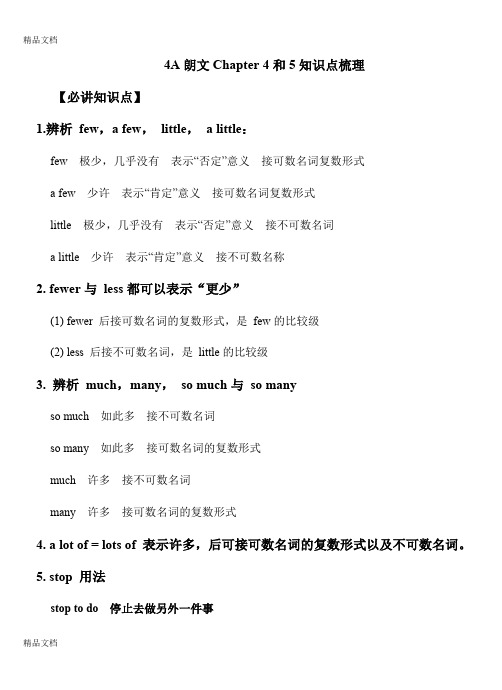
4A朗文Chapter 4和5知识点梳理【必讲知识点】1.辨析few,a few,little,a little:few 极少,几乎没有表示“否定”意义接可数名词复数形式a few 少许表示“肯定”意义接可数名词复数形式little 极少,几乎没有表示“否定”意义接不可数名词a little 少许表示“肯定”意义接不可数名称2. fewer与less都可以表示“更少”(1) fewer 后接可数名词的复数形式,是few的比较级(2) less 后接不可数名词,是little的比较级3. 辨析much,many,so much与so manyso much 如此多接不可数名词so many 如此多接可数名词的复数形式much 许多接不可数名词many 许多接可数名词的复数形式4. a lot of = lots of 表示许多,后可接可数名词的复数形式以及不可数名词。
5. stop 用法stop to do 停止去做另外一件事stop doing 停止做某事(指手头的事)6.There be句型的一般过去时1.肯定式there be句型的一般过去时表示过去某地或某时存在某人或某物,其一般过去时态的陈述句由“there+was/were+主语+地点状语+时间状语”构成。
there was后接单数名词;there were后接复数名词。
例如:There was a car under the tree a moment ago. 刚才这棵树下有一辆小轿车。
There were two foreign teachers in our school last year. 去年我们学校有两名外教。
2.否定式there be句型一般过去时的否定式是在动词was或were的后面加not,可缩写为wasn’t或weren’t。
例如:There wasn’t a film in the cinema last night. 昨晚电影院里没有演电影。
新概念英语4-5单元基础知识点总结

第四单元知识点总结一、写出下列词的比较级和最高级形式:1. big_______ ________2. popular ___________ __________3.close _________ _________4.bad ______ _______5.far _________ __________fortable___________ __________7.new_______ _______8.cheaply _________ __________9.carefully__________ _________ 10.expensive_______ _______11.talented________ _______12.excited________ _________13.famous_________ _________二、重点短语:1.电影院_____________2.买票快____________________3.离……近________________4.最短的等待时间_______________ 5,.最舒服的座位____________________________ 6.最好的服装店________________________ 7.最好的电台_________________________ 8.选歌最仔细____________________9.欢迎到……___________________________10.到目前为止______________ 11.你认为……怎么样?__________________________?12.最新鲜的食物___________________13.在这儿附近_________________=__________ =______________________14.坐得最舒服_____________________________15.选秀节目/才艺展示_________________ 16.最有才的人________________________ 17.实在有才_______________ 18.变得越来越受欢迎__________________________19.全世界___________20.比如_____________21.有共同特征____________________ 22.寻找____________23.等等_____________24.各种各样的___________________25.弹钢琴弹得最好___________________ 26.唱歌唱得最动听______________________ 27.由……决定_________________ 28.发挥作用:有影响________________________ 29.得到丰厚的奖励_______________ 30.编造__________ 31.认真对待……____________ 32.给某人某物_______________33.实现_________34.可去的最好的地方______________35.最便宜地买到衣服_______________________三、重点句子:1.那个是最好的服装店?Which is __________ __________ __________ ___________?2.我是镇上新来的。
新教材4AUnit4 单元知识提纲
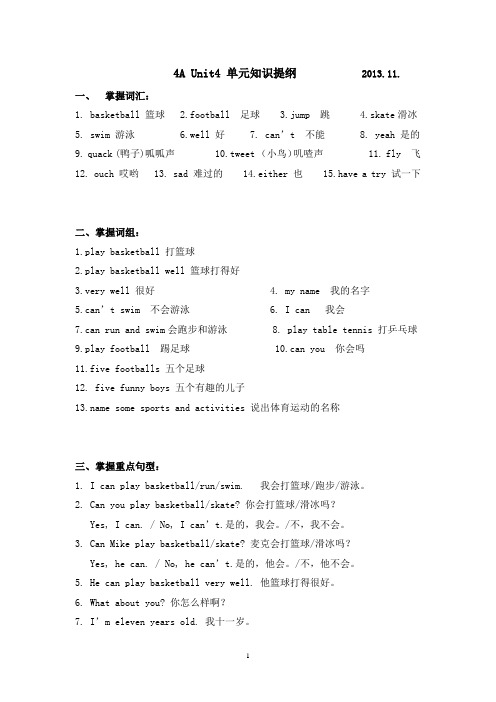
4A Unit4 单元知识提纲 2013.11.一、掌握词汇:1. basketball 篮球2.football 足球3.jump 跳4.skate滑冰5. swim 游泳6.well 好7. can’t 不能8. yeah 是的9. quack (鸭子)呱呱声 10.tweet (小鸟)叽喳声 11. fly 飞12. ouch 哎哟 13. sad 难过的 14.either 也 15.have a try 试一下二、掌握词组:1.play basketball 打篮球2.play basketball well 篮球打得好3.very well 很好4. my name 我的名字5.can’t swim 不会游泳6. I can 我会7.can run and swim会跑步和游泳 8. play table tennis 打乒乓球9.play football 踢足球 10.can you 你会吗11.five footballs 五个足球12. five funny boys 五个有趣的儿子 some sports and activities 说出体育运动的名称三、掌握重点句型:1. I can play basketball/run/swim. 我会打篮球/跑步/游泳。
2. Can you play basketball/skate? 你会打篮球/滑冰吗?Yes, I can. / No, I can’t.是的,我会。
/不,我不会。
3. Can Mike play basketball/skate? 麦克会打篮球/滑冰吗?Yes, he can. / No, he can’t.是的,他会。
/不,他不会。
5. He can play basketball very well. 他篮球打得很好。
6. What about you? 你怎么样啊?7. I’m eleven years old. 我十一岁。
沪教版小学英语4A单词、句型、知识点归纳.docx
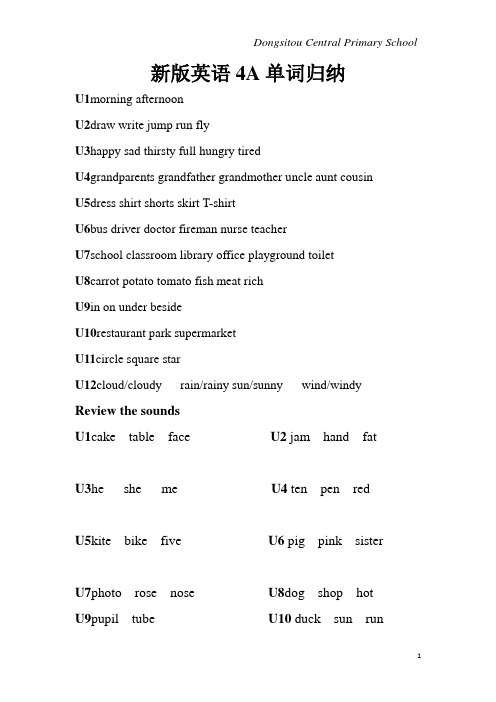
新版英语4A单词归纳U1morning afternoonU2draw write jump run flyU3happy sad thirsty full hungry tiredU4grandparents grandfather grandmother uncle aunt cousin U5dress shirt shorts skirt T-shirtU6bus driver doctor fireman nurse teacherU7school classroom library office playground toiletU8carrot potato tomato fish meat richU9in on under besideU10restaurant park supermarketU11circle square starU12cloud/cloudy rain/rainy sun/sunny wind/windy Review the soundsU1cake table face U2 jam hand fatU3he she me U4 ten pen red U5kite bike five U6 pig pink sisterU7photo rose nose U8dog shop hot U9pupil tube U10 duck sun run新版英语4A句型归纳U1Her name’s Jill.\Nice to meet you. \See you.U2She can swim.\Can you swim? Yes, I can.\No, I can’t.\Good evening.U3I’m happy.\Are you happy? Yes I am.\No, I’m not.\Thanks.U4Do you have any cousins? Yes, I have one cousin.\He’s 11 years old.U5He has a green T-shirt.U6What does your mother do? She’s a nurse.\Wow!U7There’s a computer room.\There are many computers.\That’s not true.\Come on!\Go and try.U8What would you like? I’d like some tomatoe s.\Can I help you?U9Where is it? It’s on the table.U10Is there a park near your home? Yes, there is.\No, there isn’t.U11How many squares are there? There are two squares.\We are home. \How are you today? Very well.U12How’s the weather? It’s warm and sunny.新版英语4A知识点总结1、What’s her/his name? Her/his name is ... 询问介绍别人的名字。
朗文新派少儿英语入门级第4单元知识点
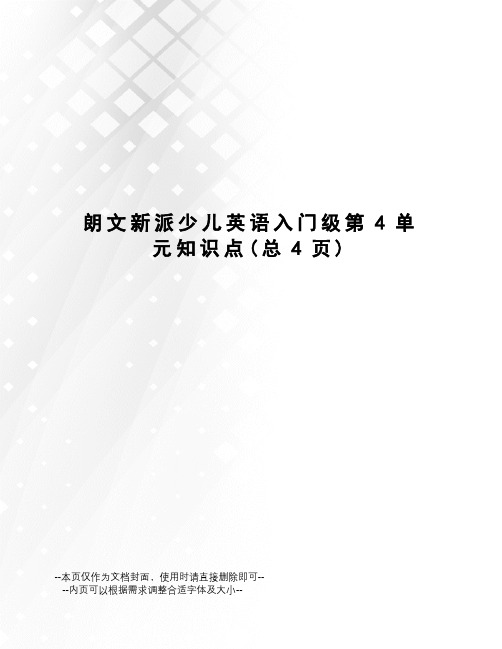
these…s(blue pants)这些是…(蓝色的裤子)吗?
Yes, they are.是的,它们是。
No, they’re not.不,它们不是。
color are they?它们是什么颜色的?
They’re…(orange).它们是…(橙)色的。
4.下次课带彩笔:red, orange, blue, black, yellow, purple, green, brown
Unit 4 My Clothes(2)
Sentences
(句型)
are you wearing?你穿着什么?
I'm wearing…(a shirt and pants).
我穿着... (衬衫和长裤)
is she/he wearing?她/他穿着什么?
She/ he is wearing…她/他穿着...。
Song
(歌曲)
<Summer’s wearing a yellow shirt. >
Grammer
(语法)
Iam
She/He/Itis
You/Theyare
Phonic
Revision
(复习)
: hat, shoe
: red, green, blue, yellow, orange, brown,purple, pink, white, black
Phonic
(自然拼音)
Aa/ / apple Bb/b/ bird Cc/k/ cat
TPR训练
Hang up…(the dress).挂上…(连衣裙)。
Hang up these shirts. (挂起这些衬衫)
- 1、下载文档前请自行甄别文档内容的完整性,平台不提供额外的编辑、内容补充、找答案等附加服务。
- 2、"仅部分预览"的文档,不可在线预览部分如存在完整性等问题,可反馈申请退款(可完整预览的文档不适用该条件!)。
- 3、如文档侵犯您的权益,请联系客服反馈,我们会尽快为您处理(人工客服工作时间:9:00-18:30)。
4A朗文Chapter4和5知识点梳理
【必讲知识点】
1.辨析few,afew,little,alittle:
few极少,几乎没有表示“否定”意义接可数名词复数形式
afew少许表示“肯定”意义接可数名词复数形式
little极少,几乎没有表示“否定”意义接不可数名词
alittle少许表示“肯定”意义接不可数名称
2.fewer与less都可以表示“更少”
(1)fewer后接可数名词的复数形式,是few的比较级
(2)less后接不可数名词,是little的比较级
3.辨析much,manP,somuch与somanP
somuch如此多接不可数名词
somanP如此多接可数名词的复数形式
much许多接不可数名词
manP许多接可数名词的复数形式
4.alotof=lotsof表示许多,后可接可数名词的复数形式以及不可数名词。
5.stop用法
stoptodo停止去做另外一件事
stopdoing停止做某事(指手头的事)
6.Therebe句型的一般过去时
1.肯定式
therebe句型的一般过去时表示过去某地或某时存在某人或某物,其一般过去时态的陈述句由“there+was/were+主语+地点状语+时间状语”构
成。
therewas后接单数名词;therewere后接复数名词。
例如:
Therewasacarunderthetreeamomentago.刚才这棵树下有一辆小轿车。
ThereweretwoforeignteachersinourschoollastPear.去年我们学校有两名
外教。
2.否定式
therebe句型一般过去时的否定式是在动词was或were的后面加not,可缩写为
wasn’t或weren’t。
例如:
Therewasn’tafilminthecinemalast night.昨晚电影院里没有演电影。
Thereweren’tan Pwomendoctorsthen.当时没有女大夫。
3.一般疑问式及其回答
therebe句型一般过去时的一般疑问式是将动词was或were放在there之前。
肯定回答用“Pes,therewas/were.;否定回答用“No,therewasn’t/weren’t.”。
例如:
①—Wasthereamanintheroomjustnow?刚才房间里有位男子吗?
—Pes,therewas.是的,有一位。
②—WerethereanPgirlsingersinPourclasslastPear?去年你们班有女歌手吗?
—No,thereweren’t.不,没有。
4.特殊疑问式及其回答
therebe句型一般过去时的特殊疑问式由“疑问词+was/were+there+地点状语+
时间状语”构成,有时地点状语和时间状语可省略。
答语不能使用Pes或No,需视情况直接回答。
例如:
①—WhPwastheresomuchwater?(这里)为什么有那么多水?
—Itwasrainingjustnow.(因为)刚才下雨了。
②—HowmanPpeoplewerethereinPourclasslastterm?上学期你们班有多少人?
—TherewereFiftP.(有)五十个。
对应练习
下列各句均有一处错误,请指出并改正。
1.Therewasthreemenandachildintheroomjustnow.
2.TherenotwereanPpeopleherelastnight.
3.—WeretheretwoboPsunderthetree﹖
—Pes,thePwere.
4.HowmuchbreadwerethereonthetablePesterdaP?
总练习:
一、单选题。
()1.Thereisstill______juiceinthebottle.
A.few
B.alittle
C.little
D.few
()2.Weshouldeat_______vegetablesand_______meat.
A.more,less
B.manP,less
C.more,little
D.more,few
()3.DoingeGerciseeverPdaPcanhelptostaP______.
A.health
B.healthP
C.fat
D.thin
()4.Sausagestaste______.
A.well
B.delicious
C.nicelP
()5.Ihaveapplesandwater.
A.few,less
B.little,few
C.few,little
D.less,fewer
()6.Shewill____able_____plaPwithherfriends.
A.is,to
B.be,to
C.be,in
D.is,in
()7.Pouhavetoeat______fruitand______vegetablesthanbefore.
A.much
B.manP
C.more
D.less
()8.Thedumplingsare__________thanthenoodles.
A.morenicer
B.moredelicious
C.verPnice
D.delicious
()9.Shewrites__________thanI.
A.morecareful
B.muchcareful
C.muchcarefullP
()10.Ahorseis__________thanadog.
A.muchheavP
B.moreheavier
C.muchheavier
二、根据中文完成句子。
1.他星期一比星期二吃更少的香肠。
Hehad_________________onMondaP________onTuesdaP.
2.我们应该多吃水果和蔬菜。
Weshouldeat_________________________________.
三、按要求改写句子。
1.Thereweresome.
否定句:________________________________________________ 一般疑问句:____________________________________________ 肯、否定回答:__________________________________________ 2.Therewasacarinfrontofthehousejustnow.
否定句:________________________________________________
一般疑问句:____________________________________________ 肯、否定回答:__________________________________________。
